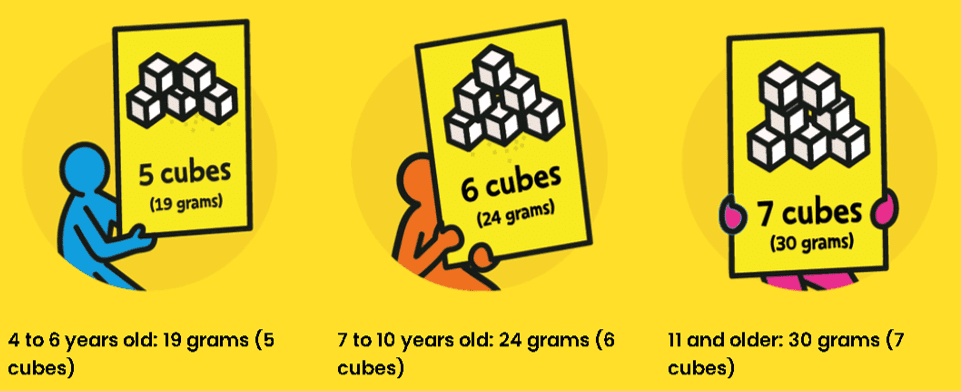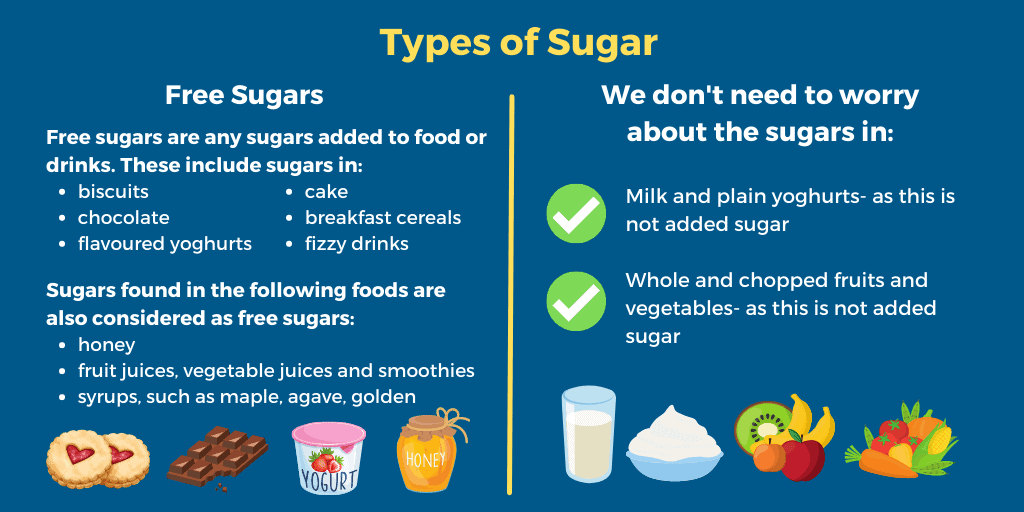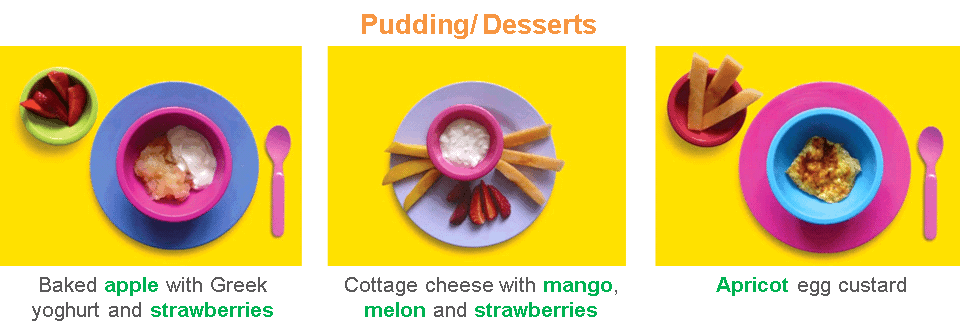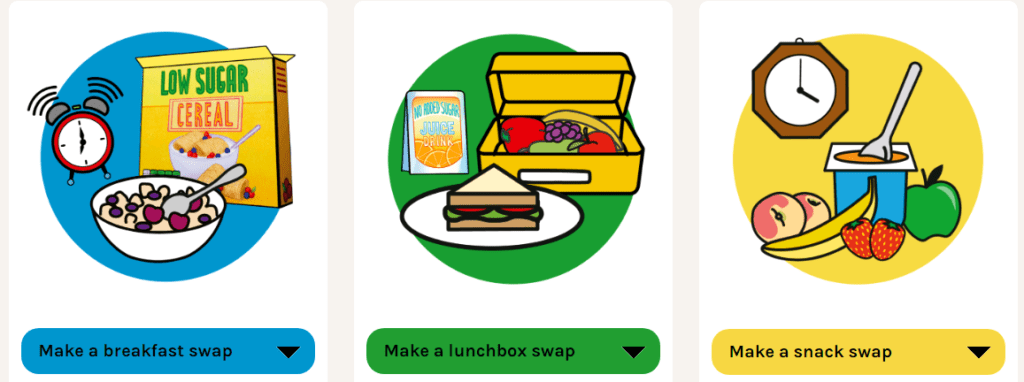Eating well is important in the early years, as it helps children to establish healthy eating behaviours which supports their growth, development and learning. Supporting children to eat a wide variety of foods helps them to develop good eating habits which they can take with them into their school years and beyond. In this blog we focus on reducing sugar across children’s meals and snacks.
Children will receive the majority of their meals at home and in early years settings. Between 1 to 2 years of age, toddlers should be offered a diverse range of foods, as this will support them to explore a wide range of tastes and textures. To ensure children get the energy and nutrition they need to grow, play and learn, we should choose foods from the following food groups across their meals and snacks.

Between the ages of 2 and 5 years, children should gradually move towards eating the same foods as the rest of the family, following the recommendations in the Eatwell Guide (opens in new tab).

Tips on Planning Meals and Snacks for Under 5’s
- Parents can find more guidance on planning meals and snacks by booking one of our FREE online courses or webinars, by clicking here (opens in new tab)
- Early Years settings can get lots of support on meeting the EYFS requirement for the provision of meals and snacks that are healthy, balanced and nutritious by booking onto our Menu Planning training, by clicking here (opens in new tab).
Reducing sugar in children’s meals and snacks
To establish good eating habits, it’s important to ensure the food and drink you provide for children is not high in saturated fat, sugar and salt. Limiting or avoiding some foods, ingredients and cooking practices will help to ensure that an appropriate amount of fat, sugar and salt is provided for children, and will also help encourage diversity in children’s diets.
Eating a diet high in sugar can lead to tooth decay and unfortunately, children in the UK are having nearly 2 times as much sugar as they should be. Sugar is also added to so many foods and drinks and, globally, we are eating too much sugar as a result. Nearly half of the sugar intake in children’s diets comes from soft drinks and high sugar snacks.
How much is too much?
Let’s look at the maximum amount of sugar children can have across the day:

Note: Younger children should have less than 19g (5 cubes) a day. Sugar and sugary foods are not recommended to be added to babies’ foods and it’s best to keep added sugar in babies diet to a minimum.
Foods to watch out for
The type of sugars that children and adults eat too much of are ‘free sugars’. These are:
- Any sugars added to food or drinks. These include sugar in biscuits, chocolate, flavoured yoghurts, breakfast cereals and fizzy drinks. These sugars may be added at home, or by a chef or other food manufacturer
- Sugars in honey, syrups (such as maple, agave and golden), nectars (such as blossom), and unsweetened fruit juices, vegetable juices and smoothies. The sugars in these foods occur naturally but still count as free sugar.
We don’t need to worry about the sugar that children have in:
- Milk and plain yoghurts– as this is not added sugar
- Whole fruits and vegetables– as this is not added sugar (Remember to keep dried fruit to mealtimes to protect children’s teeth).

Top Tips when eating out:
A fifth of children eat food from out of home (OOH) food outlets at least once a week, and so are being exposed to higher levels of sugar. This can impact on their oral health outcomes and mean that they develop a preferences for more sweet foods.
Choosing from the Menu:
- Try to make sure meals contain items from the four main food groups: starchy foods, vegetables and fruit, dairy and alternatives, and protein foods
- Pick side dishes that provide children with additional nutrients, such as cooked vegetables, side salads, and fruit sticks
- Remember, children do as you do. Make sure that you role model healthy eating outside the home too
- Ask if restaurants have kids’ menus and child-sized portions, and remember that children shouldn’t be forced to finish everything on their plate.
Drinks
- Instead of sugary fizzy drinks, order a big jug of tap water for the table and encourage your children to help themselves. A glass of milk is also a great option.
Dessert
- Fresh fruit is a healthy, nutritious dessert option. However, if you do choose desserts such as brownies, cakes, and ice cream, try sharing them to help cut down on the amount of sugar children have.

On the Go Options
Before heading out, consider packing snacks to take with you. This will mean that you don’t spend a fortune on sugary snacks such as bars, cakes and biscuits. You can find lots of great snack inspiration in our blog ‘Snack Ideas for Children’ (opens in new tab).
If you’re buying items that are pre-packed, keep an eye out for the amount of sugar they contain:
- When looking at a label take a look at the nutrition information ‘per 100g’ as this will allow you to make an easy comparison between different products. So when looking for a low sugar product a good choice is one that has less than 5g of sugar per 100g!
- Another useful thing to know, is that most pre-packed food products have a list of ingredients on the packaging, which can also help us to work out how nutritious a food product is. The ingredients are listed in order of weight, so the main ingredients in the packaged food always come first – if you see sugar listed as one of the first three ingredients that product is likely to be high in sugar.
Watch out for added sugar, which is sugar that has been added to food and drink to sweeten it. It’s not just white sugar, it includes fruit juice, honey, syrups and nectars, brown sugar, glucose, fructose. You can find out more on the NHS website here (opens in new tab).
- Limit dried fruit to mealtimes only and avoid offering them at snack times. Dried fruits are very sticky and can stick to the teeth for a long time, increasing the risk of tooth decay. Offering them with other foods at main meals will help to protect teeth
- Commercial fruit snacks, baby fruit purées, cereal bars and fruit leathers all contain sugars which can damage teeth and should be avoided at snack times
- Swap fruit flavoured and chocolate yoghurts for plain, Greek or natural yoghurt and add fruit for extra flavour
- Check the food labels of common snacks foods as you might be surprised about the amount of sugar they contains. For example, flavoured water, fruits tinned in syrup, some breakfast cereals, ready- made sauces such as pasta sauce, marinades and condiments such as ketchup.
There are lots of ways to make healthy food swaps to help cut down on the amount of sugar in children’s meals and snacks:
- Swap juice drinks for water or milk
- Swap chocolate or honey coated cereal for low sugar cereal with fruit
- Swap biscuits for rice cakes with cream cheese and apples slices

Resources for Families:
- Visit Better Health Healthier Families (opens in new tab) for sugar swap ideas!
- Vist Early Start Nutrition parents hub (opens in new tab) which has details on our FREE webinars and parent courses

